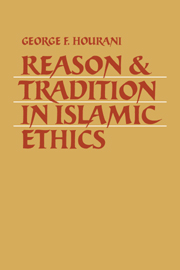Book contents
- Frontmatter
- Contents
- Preface
- Foreword by Michael Marmura
- Conventions
- Titles and locations of the original articles
- Introduction
- 1 Islamic theology and Muslim philosophy
- 2 Ethics in classical Islam: a conspectus
- 3 Ethical presuppositions of the Qurʾān
- 4 ‘Injuring oneself’ in the Qurʾān, in the light of Aristotle
- 5 Two theories of value in early Islam
- 6 Islamic and non-Islamic origin of Muʿtazilite ethical rationalism
- 7 The rationalist ethics of ʿAbd al-Jabbār
- 8 Deliberation in Aristotle and ʿAbd al-Jabbār
- 9 Ashʿarī
- 10 Juwaynī's criticisms of Muʿtazilite ethics
- 11 Ghazālī on the ethics of action
- 12 Reason and revelation in Ibn Ḥazm's ethical thought
- 13 The basis of authority of consensus in Sunnite Islam
- 14 Ibn Sīnā's ‘Essay on the secret of destiny’
- 15 Averroes on good and evil
- 16 Combinations of reason and tradition in Islamic ethics
- Select bibliography
- Index
12 - Reason and revelation in Ibn Ḥazm's ethical thought
Published online by Cambridge University Press: 13 October 2009
- Frontmatter
- Contents
- Preface
- Foreword by Michael Marmura
- Conventions
- Titles and locations of the original articles
- Introduction
- 1 Islamic theology and Muslim philosophy
- 2 Ethics in classical Islam: a conspectus
- 3 Ethical presuppositions of the Qurʾān
- 4 ‘Injuring oneself’ in the Qurʾān, in the light of Aristotle
- 5 Two theories of value in early Islam
- 6 Islamic and non-Islamic origin of Muʿtazilite ethical rationalism
- 7 The rationalist ethics of ʿAbd al-Jabbār
- 8 Deliberation in Aristotle and ʿAbd al-Jabbār
- 9 Ashʿarī
- 10 Juwaynī's criticisms of Muʿtazilite ethics
- 11 Ghazālī on the ethics of action
- 12 Reason and revelation in Ibn Ḥazm's ethical thought
- 13 The basis of authority of consensus in Sunnite Islam
- 14 Ibn Sīnā's ‘Essay on the secret of destiny’
- 15 Averroes on good and evil
- 16 Combinations of reason and tradition in Islamic ethics
- Select bibliography
- Index
Summary
Normative ethics (akhlāq) in the sense of wise advice for a good and happy life, was written about by Ibn Ḥazm in two well-known books, Ṭawq al-ḥamāma ('The dove's neck ring’) and Mudāwāt an-nufūs ('Cures for souls’). The following article, however, is not concerned with his views on ethics in that sense, but with his answers to fundamental questions of modern philosophical ethics: the meanings of ethical concepts, the sources of our knowledge of them and of values in practice, the theory of moral motivation. In the religious tradition of medieval Islam, to which Ibn Ḥazm for all his individuality belonged, these questions were not marked off as a separate field of knowledge but fell somewhere between theology and law. More precisely, theology provided the framework of doctrines from which the principles of ethics could be derived, and these principles were applied by jurists in working out Islamic law.
Accordingly, we find Ibn Ḥazm's treatment of philosophical ethics mainly in his major work on theology, the Fiṣal, and his major work on jurisprudence, the Iḥkām. Both these works were written in the later years of his life, when his theological and legal position as a Zahirite was settled, and together with other works of the same period they supply a unified theory of ethics. His last work, Mudāwāt an-nufūs, although of a different literary genre, also throws light on this theory and is consistent with it. All these writings, then, will be used to reconstruct his ethics.
- Type
- Chapter
- Information
- Reason and Tradition in Islamic Ethics , pp. 167 - 189Publisher: Cambridge University PressPrint publication year: 1985
- 1
- Cited by

